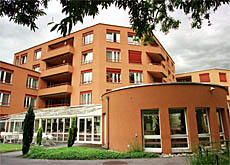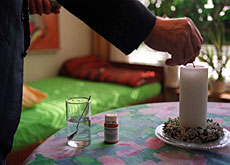Medical body relaxes rules on euthanasia

The Swiss Academy of Medical Sciences (SAMS) has told doctors they can help terminally ill patients die but only under strict conditions.
Thursday’s announcement marked a U-turn by the academy, which had previously been firmly against all forms of euthanasia.
“We still state that assisted suicide is not part of normal medical practice, but we add that there are situations where assisted suicide can be comprehensible. So it’s no longer a complete ‘no’,” Werner Stauffacher, president of the academy, told swissinfo.
The academy, which is made up of doctors, carers and legal workers, said the Swiss authorities should respect the decisions of doctors who supply the terminally ill with lethal drugs – a form of euthanasia known as assisted suicide.
It stressed, however, that it did not support active euthanasia – when a doctor actually administers the lethal drugs to the patient – even when a patient is judged able to make such a decision.
Although active euthanasia is illegal in Switzerland, the authorities often turn a blind eye to cases of assisted suicide.
However, other forms of euthanasia, such as the withdrawal of life-sustaining drugs, are tolerated in a number of Swiss cantons, provided strict rules are followed.
Official support
The academy’s recommendations will now be reviewed by Swiss doctors and a final set of directives will be drawn up towards the end of this year.
The academy’s decision will ease the concerns of some doctors who have been convinced they are acting in the best interests of their patient but have been lacking official support.
“We want to avoid doctors, who are close to their patients, having to send them to organisations offering assisted suicide, which we consider go against medical values,” Stauffacher said.
“We don’t want to let down the physician and we don’t want to let down his or her patient.”
However, the academy said strict conditions should be met before such an action is taken.
Firstly, the doctor must be certain that the patient is close to dying. They must be able to determine that the patient has only a matter of days or weeks to live.
Secondly, the patient must be in a fit state to make a considered decision.
In addition, this decision must be made after a thorough process of contemplation and must not be influenced by pressure from others.
The doctor must also make sure that he or she has proposed all the available treatments to the patient.
Finally, in all cases, the patient must administer the lethal drugs themselves.
Ongoing debate
Dick Marty, a Swiss parliamentarian who has called for a debate on euthanasia in the Council of Europe, said the academy’s directive was a step in the right direction.
“These draft directives do not diminish the value of life, in fact they do the opposite,” he told swissinfo. “They stress the importance of a patient’s wishes.”
Marty’s proposal – that doctors who help terminally ill patients to end their lives should be exempt from punishment – was rejected by the parliamentary assembly of Council of Europe for the second time in January.
Recent studies show that Switzerland has the greatest number of cases of assisted suicide in Europe.
The presence of organisations offering this service, such as Dignitas and Exit, is believed to have contributed to this ranking.
A report by the University of Zurich last year found that seven out of ten terminally ill people in Switzerland ended their lives through different types of euthanasia.
The House of Representatives rejected the decriminalisation of active euthanasia two years ago.
swissinfo
Assisted suicide is when a doctor provides a patient with the means to end his own life; however, a doctor does not administer it.
Assisted suicide is tolerated in Switzerland.
The number of assisted suicides in Switzerland has increased steadily over the past four years.
According to figures released by the University of Zurich, more than 250 people ended their lives in this way in 2003.
In 1999 around 100 assisted suicides were recorded.

In compliance with the JTI standards
More: SWI swissinfo.ch certified by the Journalism Trust Initiative











You can find an overview of ongoing debates with our journalists here . Please join us!
If you want to start a conversation about a topic raised in this article or want to report factual errors, email us at english@swissinfo.ch.